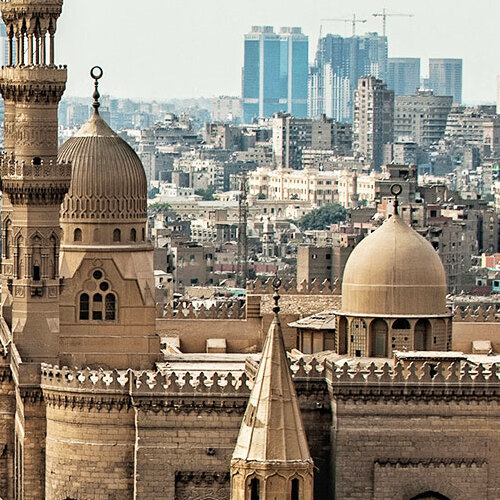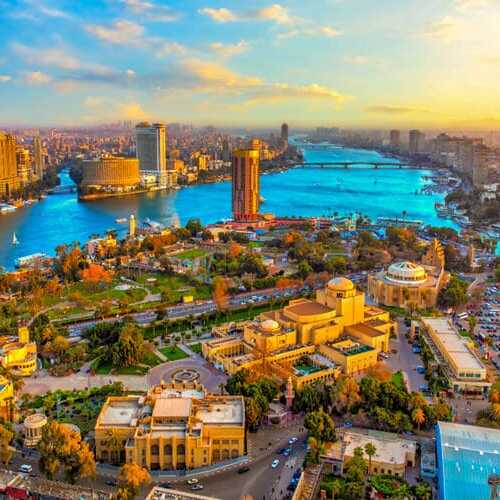No other nation in the world says ‘Welcome’ as often as the Egyptians, and every time, they mean it. While the ancient civilization of Egypt continues to amaze, contemporary Egyptians are equally remarkable.
The Khayrbek Complex
The Khayrbek Complex: A Historical Tapestry Woven into Cairo’s Heart
In the bustling core of Cairo, the Khayrbek Complex stands as a testament to the city’s layered history, a magnificent confluence of architectural and historical narratives. This complex, a blend of various structures, encompasses a mosque, the vibrant Sharia Street At-tabbanah, and a tomb, each element contributing to a rich historical mosaic.
The origins of the complex are intertwined with the life of Emir Khayrbek, a prominent figure in the Ottoman Empire. Khayrbek, who once held the reins of governance in Aleppo during Sultan al-Ghouri’s rule, is etched in the annals of history for his pivotal role in the Battle of Marj Dabiq in 1516. His notable shift in allegiance, betraying al-Ghouri, was a turning point in the battle’s outcome.
Following this historic confrontation, Selim I emerged as the new Ottoman ruler. Khayrbek, aligning himself with the victorious Selim I, journeyed back to Egypt and was appointed the governor of the region. This transition marked not only a significant chapter in Khayrbek’s life but also a transformative moment in the political dynamics of the Middle East.
The Khayrbek Complex extends beyond the mausoleum of Emir Khayrbek. It is a sanctuary of historical structures that span different eras, including various Ottoman houses and the 13th-century Alin Aq Palace. These edifices are intricately linked, forming a network that mirrors Cairo’s complex and multifaceted history.
A visit to the Khayrbek Complex is akin to embarking on a voyage through time. It allows one to delve into Cairo’s Ottoman period, offering a window into the architectural splendor and historical depth that have sculpted the city’s unique identity. The complex is not just a cluster of old buildings; it is a living narrative, encapsulating centuries of stories and cultural evolution.
In the heart of a city where the past and present coexist in a dynamic embrace, the Khayrbek Complex stands as a proud reminder of Cairo’s enduring spirit. It invites explorers to wander through its corridors, courtyards, and streets, each step a discovery of the rich tapestry that makes Cairo not just a city but a chronicle of human civilization.
Created On March 18, 2020
Updated On July 21 , 2025
- Al-Azhar Mosque
- Al-Azhar To The Citadel
- Amir Taz Palace
- Aqsunur’s Mosque
- Bab Zuweila
- Beit Al-Harrawi
- Beit Al-Suhaymi (Al-Suhaymi House)
- Beit Zeinab al-Khatoun
- Bein al-Qasreen STREET (Between The Two Palaces {Street})
- Ben Ezra Synagogue
- Church of St. Barbara
- Coptic Cairo
- Egyptian Textile Museum
- Gawhara Terrace
- Gayer-Anderson Museum
- Ibn Tulun Citadel
- Khan Al-Khalili Bazaar (Cairo’s Most Famous Bazaar)
- Khanqah & Mausoleum of Sultan Baybars al-Gashankir
- Khanqah-Mausoleum of Farag Ibn Barquq
- Madrassa & Mausoleum of as-Salih Ayyub
- Madrassa & Mausoleum of Qalawun
- An-Nasir Mohammed Bin Qalawoon Mosque
- Madrassa And Mausoleum of Barquq
- Mausoleum of Al-Ghouri
- Midan Al-Hussein (Sayedna Al-Hussein Square)
- Mosque of Al-Hakim
- Mosque of Al-Mu’ayyad Shaykh
- Mosque of al-Aqmar
- Mosque of Amr ibn al-As
- Mosque of An-Nasir Mohammed
- Mosque of Aslam al-Silahdar
- Mosque of Ibn Tulun
- Mosque of Mohammed Ali
- Mosque of Sayyidna al-Hussein
- Mosque-Madrassa of Al-Ghouri
- Mosque-Madrassa of Sultan Hassan
- Mosque-Madrassa of Umm Sultan Sha’aban
- Museo Mevlevi
- Museum of Islamic Art
- Northern Cemetery
- Northern Enclosure
- Northern Walls and Gates
- Sabil And Kuttab Of Abdel Rahman Katkhuda
- Sabil of Muhammed Ali Pasha
- Sharia al-Muizz li-Din Allah
- The Church of St Sergius & Bacchus
- The Citadel Of Saladin
- The Complex of Sultan Ashraf Barsbey
- The Coptic Museum (The Only Coptic Museum In Egypt)
- The Egyptian Museum
- The Hanging Church
- The Khayrbek Complex
- The Mosque of Sultan Qaitbey
- The Roman Towers
- Wikala al-Bazara
- Wikala of Al-Ghouri



